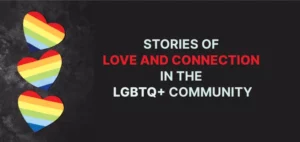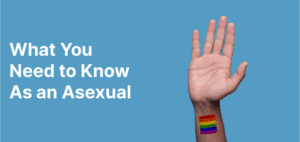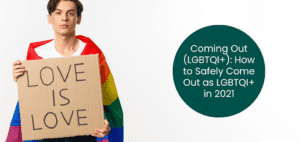Introduction
Some people try on a social label to check whether it fits them, then switch to a different one if it does not. It is also acceptable. Some people are homophobic [1] and terrified of orientation prejudices, having difficulty coming out to others or even themselves. It is a severe concern that may need professional help.
So, are you confused about your sexual orientation too? We have prepared this article to help you regarding the same and discuss some points to understand this topic better.
Our Wellness Programs
What is Sexual Orientation?
Asking yourself this is a typical occurrence. For some people, understanding their sexual orientation [2] might take years, if not a lifetime. People frequently find themselves ‘questioning’ their orientation for some time or that none of the labels used to characterize it matches them.
Sexual orientation is different from sexual identity. To whom you want to be romantically involved or feel attracted is sexual orientation. Sexual orientations can be straight, asexual, bisexual, lesbian, or gay.
Looking for services related to this subject? Get in touch with these experts today!!
Experts

Banani Das Dhar

India
Wellness Expert
Experience: 7 years

Devika Gupta

India
Wellness Expert
Experience: 4 years

Trupti Rakesh valotia

India
Wellness Expert
Experience: 3 years

Sarvjeet Kumar Yadav

India
Wellness Expert
Experience: 15 years
How Do I Know My Sexual Orientation
Many people are better equipped than others to comprehend their identities at maturity. Maturity is achieved when hormone-induced thoughts and temper issues no longer influence an individual. Still, sexuality may change for a person with time. According to research on people’s sexualities from adolescence to early adulthood, significant changes were predicted from late adolescence to the early 20s and early 20s to the late 20s. It demonstrates that sexuality development continues into adulthood [3].
People get to know about gender identity and sexual orientation from how they feel from a very early age. Sexual orientations might form by biological factors even before your birth.
Is It Possible For Others To Deduce My Sexual Orientation?
No. If you don’t inform about your sexual orientation, people won’t know. Only you know how you feel inside, and only you know what it’s like to be you. Some people believe they can tell if someone is lesbian, gay, or bisexual based on their appearance, clothing, or behavior. But these are stereotypes or oversimplifications of how lesbians, gays, and bisexuals behave. However, much like heterosexuals, homosexuals and bisexuals can appear, dress, and act differently. Using preconceptions to categorize another person’s sexual orientation may be wrong and harmful.
What identities are linked to Sexual orientation?
Sexual orientation refers to the people you are attracted to romantically, emotionally, and sexually. It’s not the same as gender identity. Gender identification refers to who you are—male, female, genderqueer, etc. Being transgender (feeling your assigned sex is quite different from the gender you identify with) is not similar to being gay, lesbian, or bisexual. To whom you desire to spend your time is orientation. It’s all about who you are when it comes to gender identification.
Several identities are linked to sexual orientation:
- Straight or heterosexual people are attracted to the opposite gender (for example, women are attracted to men, and men are attracted to women).
- Homosexuals are attracted to members of the same gender.
- Bisexuals are attracted to both men and women.
- Pan-sexual or queer are those people who like people of all gender identities (male, female, transgender, genderqueer, intersex, and so on).
- People who are unclear about their orientation may describe themselves as queer or inquiring.
- Asexual people are those who have no sexual attraction to anyone.
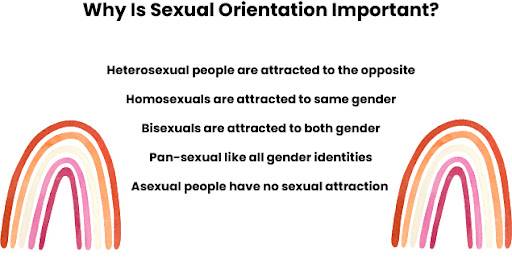
If your sexual orientation is Gay or Lesbian, Is it a Sin?
It is not a sin to be gay or a lesbian. You are free to choose your sexual orientation. When a person is born, they are biologically either male or a female. As they grow, they develop an understanding of their sexual orientation. The person discovers that they are attracted to people of the same or opposite gender. There is no harm in it. Individuals’ sexual orientation is exclusive to them and is not affected by surrounding factors.
Earlier, people regarded left-handedness as an anomaly. As a result, many youngsters were chastised, punished, and even forced to switch to right-hand for writing or eating. It had a detrimental effect on countless children during their childhood. People now understand that using the right or left hand as the dominant hand is not preferred.
Similarly, many individuals cannot understand that sexuality is not a personal choice and does not need to be ‘handled!’ Despite the medical and scientific support for homosexuality, people with same-sex attractions are stigmatized, ridiculed, and isolated by society. Because of the lack of societal acceptability, gay and lesbian people are more likely to suffer from depression, anxiety, and other mental illnesses. Despite personal, religious, or moral views on sexual orientation or sexuality, our collective obligation should be to foster acceptance rather than stigmatizing those we consider different or in the minority.
What Determines Sexual Orientation?
Most experts agree that homosexuality and bisexuality result from emotional, environmental, biological, and hormonal factors. Put another way; various variables influence an individual’s sexual orientation. These factors also vary among individuals. Homosexuality and bisexuality aren’t created by how parents raise their children or by something that occurred to the child when young. Being bisexual or homosexual does not imply that the individual is mentally unwell or aberrant. Preconceptions or misconceptions held by others may burden them.
Many individuals find their gender identity as teenagers or young adults with little or no prior sexual experience. Someone may observe, for example, that their sexual ideas and behaviors are focused on individuals of similar sex or both sexes. However, you don’t have to be homosexual or bisexual to fantasize about someone of the same sex. Sexual orientation isn’t a choice and can’t be altered. Some homosexuals and bisexuals may conceal their sexual orientation to prevent prejudice from others or escape the embarrassment they feel regarding their sexuality. Conversion therapy and other attempts to convert somebody to a heterosexual are ineffective and harmful.
Learn more about Hyperfixation vs. Hyperfocus
Do you think life is pointless?
Know about How To Make Him Worry About Losing You?
Conclusion
Not only for adolescents but also for their families, adolescent sexual development can be perplexing and anxiety-inducing. While many parents find their children’s sexuality a sensitive, complex, and even terrifying subject, they should remain patient and nonjudgmental. Teenage gender identity and sexual orientation continually evolve and change. The teenage maturation process frequently involves “putting on” and experimenting with various identities, roles, and behaviors, as this article has addressed throughout. This form of experimenting extends to sexual identity and sexual activity. While some parents are OK with their children having any gender identity or orientation as long as they are happy and content, others are not. Reach out to experts if you feel you need help.
Follow our Social Media for more updates:
References
| [1] | A. Ventriglio, J. M. Castaldelli-Maia, J. Torales, D. De Berardis, and D. Bhugra, “Homophobia and mental health: a scourge of modern era,” Epidemiology and Psychiatric Sciences, vol. 30, 2021, doi: 10.1017/s2045796021000391. |
| [2] | Wikipedia Contributors, “Sexual orientation,” Wikipedia, Jul. 18, 2022. https://en.wikipedia.org/wiki/Sexual_orientation (accessed Jul. 28, 2022). |
| [3] | M.-A. Boislard, D. van de Bongardt, and M. Blais, “Sexuality (and Lack Thereof) in Adolescence and Early Adulthood: A Review of the Literature,” Behavioral Sciences, vol. 6, no. 1, p. 8, Mar. 2016, doi: 10.3390/bs6010008. |

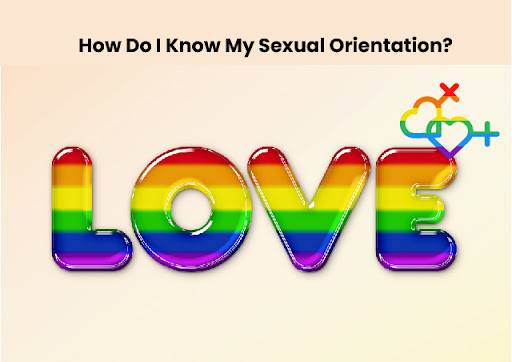
 Conflict Management in Relationships
Conflict Management in Relationships
 Healing from Heartbreak
Healing from Heartbreak Coping With Anxiety
Coping With Anxiety Get Started With Mindfulness
Get Started With Mindfulness
